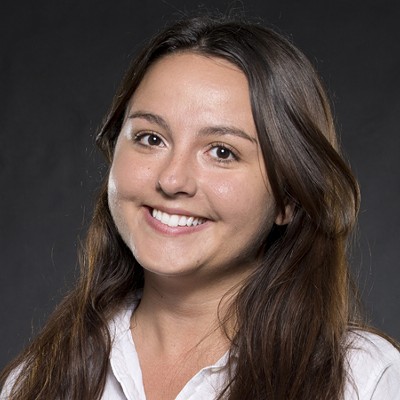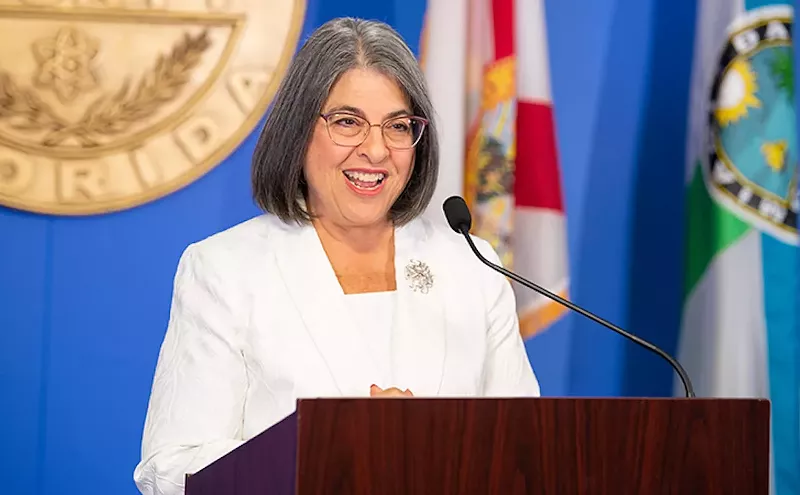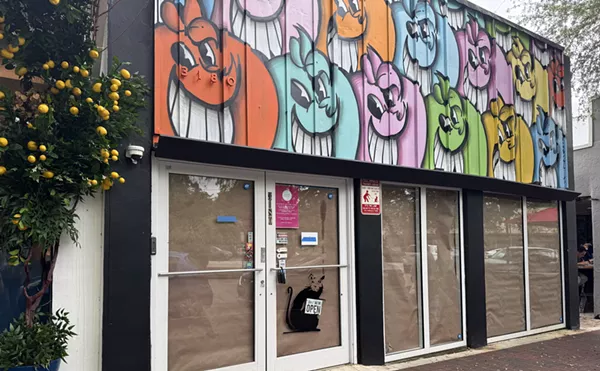This past December 3, a somber 21-year-old with long blond hair stood on the limestone outdoor stage at the center of the University of Miami's Coral Gables campus. When her name was called, she approached the microphone and detailed a violent rape she said had occurred three years ago at an end-of-year fraternity party. Her voice was steady as she recounted how she had been drinking, but not
"I was a freshman and wasn't sure if the health center even did rape kits," explained Beatrice, whom New Times has given a pseudonym because she's an alleged victim of sexual assault. "I'm a senior now, and of the 20 or so girls that lived on my floor [freshman year], six of us have been sexually assaulted, some of us drugged and then sexually assaulted. And I'm not counting the girls who were inebriated."
That afternoon on the stage, students listened to Beatrice in pin-drop silence. Some sobbed quietly in the crowd. Beatrice explained she had been afraid to come forward. She thought either no one would believe her or she'd receive backlash from the fraternity.
"You hear that there's a freshman girl at a party, and everyone blames the victim," she said. "It was intimidating."
Beatrice herself began to cry. Then Dr. Katharine Westaway, the outspoken 39-year-old adjunct professor who had organized the event and counseled Beatrice for two years, stepped forward and put her arm around the student. At the end, everyone cheered.
"Open discussion of victim justice tends to be shut down. I'm haunted by the climate this creates."
tweet this
It was one of the most powerful speeches in the history of Canes Consent, an event held each semester for the past two years to prevent sexual assault on campus. For Beatrice and other sexual assault victims at UM, talking publicly on campus about rape is a pivotal moment in recovery.
"It was so freeing to speak like that in the middle of the day on campus," Beatrice says. "The encouragement was such an important part in finding myself — that I'm not just someone that something horrible happened to, but a survivor, an advocate, and a voice."
Organizing Canes Consent has been a student requirement in Westaway's program, Women's and Gender Studies. But now, Westaway has left the university under a cloud of controversy, and the future of the event, as well as support for sexual assault victims at UM, is unknown.
"I stand before you pretty much terrified because I don't feel safe advocating for victims on this campus," Westaway said later at the December 3 event. "This hits home when I hear from UM's attorneys nearly every time I publicly speak out for victims."
For the past two years, Westaway has acted as UM's unofficial rape counselor. Dozens of students have confided in her rather than speak to deans or police. Her departure leaves students, who have long been leery of the school's tricky complaint process and limited treatment options for victims, in the lurch.
Overall, Westaway says, she helped 37 students who had been assaulted. At first, she adds, UM officials praised her for the work. But then, last spring, they declined to renew her contract, citing a campaign she launched last year for Angela Cameron, a student who was later found to have lied about an attack.
These days, the university publicly denies Cameron's case had anything to do with Westaway's departure. "The university shares" Westaway's concerns about sexual assault, says UM spokesperson Liz Amore. But privately, a top university official, who asked not to be named, cited Westaway's "poor judgment" in defending Cameron. He says it led to the decision not to renew her contract.
"I feel like open discussion of victim services and justice tends to be shut down," Westaway says. "I'm haunted by the climate this creates."
Sexual assault on campus has become a national debate. It's a sensitive issue for colleges, which must protect students from attacks while also being fair to the accused. In 2012, Florida State University star quarterback Jameis Winston was accused of (but never charged with) drugging and raping a student. Then, Columbia University student Emma Sulkowicz criticized her school for improperly handling her case. She staged an emotionally charged art piece in which she carried a mattress on campus from September 2014 to May 2015. Finally, it seemed decades of progress had been lost in November
At the University of Miami, there is a zero-tolerance policy for sexual assault and gender-based violence. Advisers encourage students to seek medical treatment at an on-campus clinic or at the
According to UM's annual security report, 13 forcible sex offenses occurred on campus between 2012 and 2014 (the numbers for 2015 are not available yet). But according to Westaway, the rate is much higher.
"The numbers are increasing — a few weeks ago, three students came to me in one day," Westaway says. "And that's just me, one professor. What chills me are those who suffer in silence."
Westaway grew up in Boston thinking she wanted to be a journalist. But her true passion was feminist literature and poetry. She wrote some herself. Then, in 2005, she moved to Miami to earn her master's degree in English. In 2007, she received a graduate certificate in Women's and Gender Studies from the University of North Carolina. Afterward, she moved to Gainesville to complete her
Westaway returned to UM in 2012, teaching freshman English classes and lecturing on feminist theory. With a cherubic face and blond hair, she looked like just another student on campus. In the classroom, she was known for being approachable, welcoming anyone to her office to talk.
"Dr. Westaway inspired me to be more empowered," says Maleeha Riaz, a UM senior. "I was a shy freshman, and I learned so much from her, not only as a professor but as a mentor too."
"I love this school, but there are a lot of privileged students who don't care," says Isabel Del Fuente, another former student. "Dr. Westaway has this way of getting people involved, really firing them up."
After meeting with Beatrice in 2013, Westaway decided to form a sexual assault survivor group that met twice a month in her office. It was an intimate gathering of a handful of women sharing their stories and progress. During her time at UM, Westaway also founded a chapter of the National Organization of Women and began holding Canes Consent twice a year.
"I can tell you... that right now we are unprepared to help any of these students."
tweet this
Students came to Westaway with their stories: One said she had woken up after a party and realized she had been raped. Another struggled with debilitating flashbacks, and one transgender student was raped by a man to "be cured."
In December 2014, Westaway met Cameron. The UM student alleged that another student, David Jia, had forced himself on her after a party in his off-campus apartment. Police declined to charge him because of a lack of evidence, she said, but he had been found responsible for her rape by the university. He was suspended for one semester but allowed to return to campus for the spring 2015 semester and to graduate in May.
Westaway launched the Justice for Angela campaign in January 2015. A petition circulated calling for Jia's expulsion. More than 5,000 students signed it. Cameron then alleged that Jia had beaten her twice during the semester. At the May 2015 graduation ceremony, a handful of students wore red tape on their mortarboards to represent the red tape that sexual assault victims face on campus.
It all backfired a few days after graduation. The Coral Gables Police Department released a report stating it was unable to place Jia at the locations Cameron claimed to have been attacked. Then-President Donna Shalala called Cameron's accusation "unfounded."
Lonnie Richardson represents Jia. The attorney blames Cameron for giving false information to officials but says it was Westaway's actions that provoked the students to rally against his client. "Dr. Westaway might've done good things in her career, but after what she did to David, she shouldn't have a career at all," Richardson says. "Her behavior was absolutely reckless."
Westaway defended Cameron even after investigators had found discrepancies in the young woman's testimony. "It absolutely needed to have the antiseptic of sunlight," Westaway told the student newspaper, the Miami Hurricane, in December. "Angela was mistreated. She was broken by the school."
Westaway says when she returned to campus this past August, she felt stigmatized by the officials and colleagues who once supported her. She told the Hurricane that the Dean of Students Office had even put a gag order on her, preventing her from speaking to other victims.
"I can tell you, in my opinion, that right now we are unprepared to help any of these students," Westaway said in her December 3 speech. "The vice president of Student Affairs, University of Miami Police Department, [and others] refused to give donations to this crucial event, which has garnered local and national recognition. These are the entities most responsible for sexual safety on campus."
Two weeks later, Westaway found out the university would not renew her contract. The professor then sent her students an email with the subject line "Dr. Westaway Fired but Passing the Torch." In the email, she claimed the firing was "certainly tied to my involvement in seeking justice and healing for sexual assault victims... I am not looking for UM to rehire me... I will never feel safe to work with victims or teach civic engagement at UM again."
Her email directed students to sign a petition calling for the school to create a Sexual Assault Survivor Support Center.
Another professor has been appointed to teach her classes this semester, and the National Organization for Women will find a new adviser. But Westaway's sexual assault support group will not continue.
Westaway says she's saddened that she's no longer teaching at UM but can't comment further. "UM will always hold more power, influence, and legal counsel than me," she says. "I think of that lyric from The Hunting Ground: 'What if your hard work ends in despair?'?"












